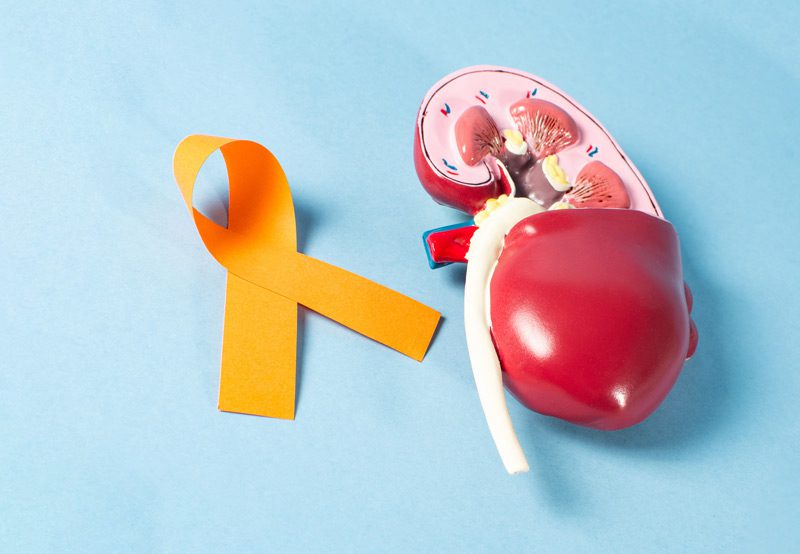

Kidney cancer occurs when abnormal cells grow uncontrollably in one or both kidneys. The most common type is renal cell carcinoma (RCC), which originates in the lining of the small tubes within the kidney. Less common types include transitional cell carcinoma, Wilms tumor (in children), and renal sarcoma. Early detection improves treatment outcomes, but kidney cancer may remain asymptomatic until it has progressed.
Symptoms of Kidney Cancer
In its early stages, kidney cancer often causes no symptoms. When symptoms appear, they may include:
- Blood in the urine (hematuria), which may be visible or microscopic
- Persistent back or flank pain, not related to injury
- A mass or lump in the side or abdomen
- Unexplained weight loss
- Fatigue
- Intermittent fever not caused by infection
- Anemia or elevated red blood cell count (erythrocytosis)
These symptoms are not exclusive to kidney cancer and require diagnostic evaluation to confirm the cause.

Causes and Risk Factors
While the exact cause of kidney cancer is not always known, several risk factors may increase the likelihood of developing the disease:
- Smoking: A well-established risk factor, especially for RCC
- Obesity: Excess weight can alter hormones that affect kidney cell growth
- High blood pressure: Chronic hypertension is linked to increased kidney cancer risk
- Family history: A genetic predisposition, especially for inherited conditions like von Hippel-Lindau syndrome
- Occupational exposures: Asbestos, cadmium, and certain solvents
- Chronic kidney disease or dialysis
- Male sex: Men are nearly twice as likely to develop kidney cancer as women
Diagnosis
Diagnosis of kidney cancer typically involves:
- Imaging Tests: CT scans, MRIs, or ultrasounds are used to identify tumors
- Urinalysis: To detect blood or abnormal cells
- Blood Tests: Evaluate kidney function and detect abnormalities
- Biopsy: In select cases, a tissue sample is taken for confirmation, though often diagnosis is based on imaging
Treatment Options
Treatment depends on the tumor size, location, stage, and overall health of the patient.
- Surgical Options:
- Partial Nephrectomy: Removal of the tumor while preserving kidney function
- Radical Nephrectomy: Complete removal of the kidney, sometimes including nearby tissues or lymph nodes
- Minimally Invasive Techniques: Laparoscopic or robotic-assisted approaches are commonly used
- Ablative Therapies:
- Cryoablation or Radiofrequency Ablation (RFA): Used in select patients with small tumors or those unable to undergo surgery
- Targeted Therapy and Immunotherapy:
- Medications that block cancer growth pathways or stimulate the immune system to attack cancer cells
- Often used for advanced or metastatic kidney cancer
- Active Surveillance:
- Appropriate for small, slow-growing tumors, especially in older patients or those with comorbidities
Next Steps
If you’ve been diagnosed with or are suspected of having kidney cancer, timely evaluation by a urologic oncology specialist is essential. A personalized treatment plan can help preserve kidney function and improve long-term outcomes. Early intervention, lifestyle adjustments, and regular monitoring play a critical role in managing this condition effectively.
